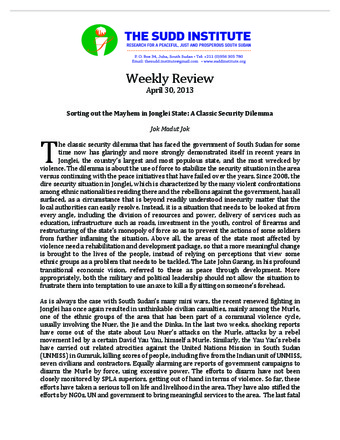Sorting Out the Mayhem in Jonglei State: A Classic Security Dilemma
Publication Summary
The classic security dilemma that has faced the government of South Sudan for some time now has glaringly and more strongly demonstrated itself in recent years in Jonglei, the country’s largest and most populous state, and the most wrecked by violence. The dilemma is about the use of force to stabilize the security situation in the area versus continuing with the peace initiatives that have failed over the years. Since 2008, the dire security situation in Jonglei, which is characterized by the many violent confrontations among ethnic nationalities residing there and the rebellions against the government, has all surfaced, as a circumstance that is beyond readily understood insecurity matter that the local authorities can easily resolve. Instead, it is a situation that needs to be looked at from every angle, including the division of resources and power, delivery of services such as education, infrastructure such as roads, investment in the youth, control of firearms and restructuring of the state’s monopoly of force so as to prevent the actions of some soldiers from further inflaming the situation. Above all, the areas of the state most affected by violence need a rehabilitation and development package, so that a more meaningful change is brought to the lives of the people, instead of relying on perceptions that view some ethnic groups as a problem that needs to be tackled. The Late John Garang, in his profound transitional economic vision, referred to these as peace through development. More appropriately, both the military and political leadership should not allow the situation to frustrate them into temptation to use an axe to kill a fly sitting on someone’s forehead.
This week, the Sudd Institute analyses this security dilemma in South Sudan, and offers some suggestions for practice.
Jok Madut Jok is trained in the anthropology of health and holds a Ph.D. from the University of California, Los Angeles (UCLA). He is a fellow of Rift Valley Institute and Director of the Sudd Institute. Jok has held fellowship positions at a number of other institutions, including the United States Institute of Peace and the Woodrow Wilson International Center for Scholars. He also served in the Government of South Sudan as undersecretary in the Ministry of Culture and Heritage for three years. He has also worked in aid and development and author of four books and numerous articles covering gender, sexuality and reproductive health, humanitarian aid, ethnography of political violence, gender-based violence, war and slavery, and the politics of identity in South Sudan and Sudan. His book Breaking Sudan: The Search for Peace, was published in 2017 by OneWorld.

